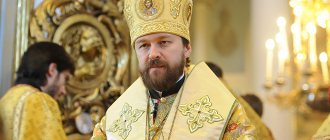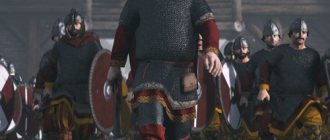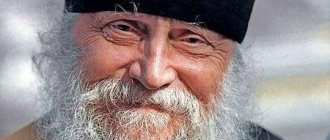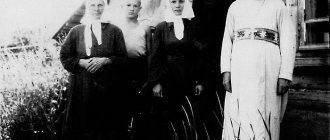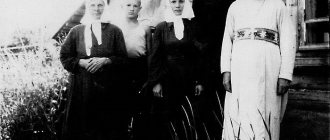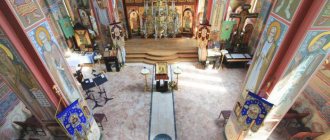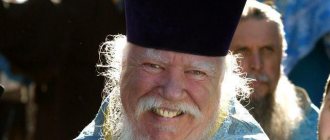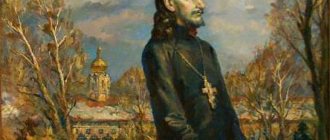Priest Pavel Ostrovsky is a popular young preacher. Conducting missionary activities on social networks, he gained trust and authority among modern youth.
“...I believe that a person who is not subscribed to God
should unfollow me."
Pavel Ostrovsky
priest
Father Pavel is a participant in the international project “Father Online”.
The priest became famous not only for his ability to tell complex things in simple words, but also for his good sense of humor, which cannot but attract attention.
Meetings of Father Pavel with schoolchildren and university students
short biography
Priest Pavel Konstantinovich Ostrovsky was born on July 7, 1982 into the family of a priest.
At the moment, he serves as rector of the St. Nicholas Church in the city of Krasnogorsk, Moscow diocese of the Russian Orthodox Church.
July 7, 1982
birthday of priest Pavel Ostrovsky
Head of the Krasnogorsk department of biblical and theological courses, teacher and publicist. Founder of the charity group “Good Deeds”.
In 2008 he graduated from the Kolomna Orthodox Theological Seminary.
On September 14, 2008, he was consecrated by Metropolitan Juvenaly of Krutitsky and Kolomna in Preobrazhenskoye in the church of Lyubertsy.
Russian Orthodox Church
The rector of the St. George Church in the village of Nakhabino, Krasnogorsk district, Moscow region, Priest Pavel Ostrovsky, was one of the first among the priests to go online with a mission. Today he is among the leaders among Orthodox bloggers on the Russian Internet in terms of the number of subscribers to his pages. In an interview with a correspondent of the Journal of the Moscow Patriarchate, Father Pavel told how the Christian mission on the Internet began, what are the rules for preaching online and who can do it. The interview was published in the Journal of the Moscow Patriarchate (No. 1, 2022, PDF version).
— Father Pavel, you preach on such online platforms as Instagram, Facebook, Telegram, YouTube, and appear on the Spas TV channel. Is the audience of these resources fundamentally different?
- Yes, definitely. Viewers of the Spas TV channel are mainly middle-aged and elderly people who watch TV. Among them there are not many people who use the Internet. And those of them who do go online most often also watch “Spas” via the Internet.
If we talk about social network users, then Instagram is more of a women's social network. Of my 140k followers on Instagram, 84% are women. Men spend more time on YouTube and VKontakte. Men are less emotional and not as active in comments, so it is more difficult to establish contact with them through social networks.
— Do they listen and read more without engaging in dialogue?
- In order to convey something to a man, it is better to talk to him personally, when you have the opportunity to literally break down what is the meaning of our faith, why we are believers, why atheism is unacceptable for us. Men don’t sit around for long on live broadcasts on the Internet. And those men who do watch me are, as a rule, already married people, their wives are regular viewers of my broadcasts, while their husbands first listen from afar and gradually get involved too.
If we talk about other Internet resources, then on Facebook there are rarely any discussions or battles. I, too, have never been particularly involved in missionary work here. Instagram and YouTube are more convenient for this. There you can conduct live broadcasts, reach audiences far from the Church, people can ask questions that interest them. Thus, a person’s internal barrier is removed. And in the future he may go to church. The fruits of missionary work are obvious to me here.
— How did communication with such a wide and diverse audience influence the style and content of your sermon?
“I’ve been doing this for many years and over the years I’ve become more restrained and less emotional. When you write a post on Instagram, from 100 to 200 thousand people will see it, and if a successful post, which is called “viral”, when it has a large share, then up to half a million will see it. And if, for example, 100 thousand people watched me, and one percent didn’t like me, then that’s one thousand people. Therefore, you need to be patient. Perhaps your post will be restrained and may not “catch” everyone, but at least it will not lead you away from the Church.
In addition, I came to the conclusion that we should try not to raise any particularly controversial topics. These include the topic of vaccinations - whether they should be done or not, school or home education, breast or artificial feeding, the presence or absence of the husband during the birth of his wife. Although the topics are “holivar” (from the English holy war - holy war), as they say on the Internet, when everyone starts arguing, breaking spears, they do not give anything in missionary terms. Everyone just gets annoyed. You can raise deep topics related to spiritual life - prayer, fasting. They are also hot, but they are beneficial.
— You started going online with questions of faith in the early 2000s, not yet being a priest. What prompted you to do this?
“I started doing this out of curiosity and ebullient energy that I had nowhere to put. I can’t say that by organizing debates on religious topics on the Internet, I brought someone to God or did something useful. The first years of my performances on the Internet could not be called particularly successful. And he had no experience, and was overly emotional, trying not to listen to the person, but to prove something to him. All these mistakes are made by any new missionary. I remember that at first everyone was just texting, there was no way to broadcast live. The text messaging format is not very suitable for a mission, because your words can always be misunderstood, reinterpreted, and you yourself can misunderstand the person. And while you convey to each other what you wanted to convey, you will get tired and simply will not be able to perceive the other person.
For the first time, the opportunity to conduct live broadcasts appeared on the Periscope social network. This was four years ago. The missionary fruits were obvious! I remember the first year of conducting live broadcasts on Periscope - and I did them every day - took place in a very simple format: I turned on the camera, and anyone could ask me a question in the chat. People saw me. At first I made a mistake: then I was already a priest, but I broadcast not in a cassock with a cross, but in secular clothes. When I began to speak in vestments, my appearance alone began to “catch” people, since I was then the first and only priest in this social network.
—And what were the missionary fruits?
— During the first year of my live communication via Periscope, more than three and a half thousand people decided to confess for the first time in their lives. And it was certainly a success!
Then it became quite obvious to me that we should gradually abandon the text format and switch to video.
At some point, the Periscope social network had technical problems; other social networks took over the initiative, adding the ability to broadcast live. I then moved to Instagram, where I already had much more followers. It turned out to be a good symbiosis: you can go live and write texts that can also encourage people to watch your broadcasts.
— You said that at the beginning of your mission on the Internet you were not particularly supported by priests, especially the older generation. What worried them?
— The unknown is alarming. In those years, the clergy was not particularly present on the Internet. The Church had a very cautious attitude towards the network. I felt a very serious confrontation myself. There were also sarcastic jokes from fellow priests, like, here we have an online priest, a priest from the Internet.
Many priests, including older ones, did not understand that our country is in great need of missionary work. Most people not only deny the authority of the Bible and the Church, but they simply do not know anything about the Bible or the Church. They will not go to churches for sermons; at best, they will go to bless the cake, get some holy water, maybe once a year they will confess and receive communion. That's all. They are on TV, some on the Internet. If we don’t come to them, then sectarians and representatives of other religions will come to them and are already coming. And they are actively doing this.
The priests told me that I need to pray, that in fact everyone knows everything, that these are spiritual problems, not missionary ones. I even had to explain to fairly experienced priests, whom I deeply respect, that people don’t read anything, they don’t know anything. And this applies not only to those who do not go to churches, but also to many churchgoers. When in a sermon they hear the words “grace”, “God’s mercy”, “sin”, “passion”, most do not understand what they really mean. Well, in general, sin and passion are bad, but God’s mercy and grace are good. That is, we are for everything good, against everything bad. But ask church-going Christians who was first - Abraham or Moses, they are unlikely to answer, because no one really read the Bible.
But when people began to come to the temple, called through the Internet, that is, when fruits began to appear, then the attitude towards the mission on the Internet began to change.
— What is the fundamental difference between preaching in church and preaching online?
— In church, approximately the same people listen to you, many of whom are your regular parishioners. Online everyone listens to you, you are on public display, any mistake you make can be used against you. Therefore, it seems to me that only the person who has been placed in this place from above, that is, by the Hierarchy, who knows that he will be responsible for his activities, if necessary, can be publicly visible, and who is called to this by God.
I look from the outside at how many lay people and priests are engaged in what they think is missionary work, and I understand that if you talk about God in a boring way, then you are not talking about God well. If after communicating with you a person begins to feel melancholy and boredom, then some Protestant preacher who can talk outright nonsense, but does it lively and cheerfully, will be better perceived by a person who is not very knowledgeable in matters of faith.
— How can a priest understand whether he has a calling to missionary work?
- If this talent exists, it is still impossible to hide it. Our main missionary was the Apostle Paul, who said that “to the Jews I was like a Jew, to the Greeks like a Greek, I became everything to everyone, so that I could lead at least some to the Lord.” If you can tell non-believing people about God in their own language and they eventually begin to become interested in Orthodoxy, then you have this gift. But if you do not arouse interest among an unbeliever or non-Christian audience, if you are unable to convey the Word of God in their language, then it means that you simply do not have a missionary gift. If no, then no. As the Apostle Peter said, everyone should serve with the gift that the Lord has given. For example, I know for sure that I do not have a theological gift, so I never touch on theological topics.
— Could you formulate the basic rules of the mission on the Internet?
— First of all, everything must be supported by spiritual life. You can’t talk about things that you yourself don’t experience and don’t understand. You need to learn to listen to people, because even if a person is not a Christian and does not believe in God, this does not mean at all that he is a bad person. You need to be able to listen, find something good in a person and try to develop it. A missionary is not one who constantly talks, but one who listens carefully to a person and tries to understand him. This became obvious to me when I read about the mission of St. Nicholas of Japan, who said: first love a person, then wait until he loves you back, and then tell him about Christ. It is clear that to love a person is first of all to understand him. Then wait until he begins to trust you, and only then tell him about Christ.
— Today it is much more difficult to retain an audience than when you started in the 2000s, because, as you said, too many preachers have appeared, and not only Christian ones. What should a missionary do in this situation?
“You have many teachers, but few fathers,” wrote the Apostle Paul. That is, there are many teachers, but few fathers. And these words of his are especially relevant today. We really have coaches at every step (from the English coach - instructor), trainers, etc. There are only nurturers all around.
But this does not make human life more warmth and meaning. But sometimes people simply lack banal friendliness, including in parishes. Sometimes you don’t need to tell something for a long time, you just need to be a father, that is, show a warm fatherly attitude towards a person. And it will become a ray of light in this stream of vanity, people immediately respond to it.
Today is the most fertile time for missionary work. Because there are a lot of people who thirst for warmth and the fullness of life in God, and they are looking for truth. As Christ said about fishers of men, you need to find a hook to hook a person so that he understands that you do not wish him harm, you treat him kindly.
— A new program with your participation is being launched on the Spas TV channel. What kind of transmission will this be?
— If everything works out, then from the new year there will be a daily morning program with presenters who will wake people up for work. I will become one of the presenters. This is also a responsible service, partly missionary.
***
Priest Pavel Ostrovsky was born in 1982 in Moscow into the family of priest Konstantin Ostrovsky. His two older brothers also chose the path of the clergy. In 2008 he graduated from Kolomna Theological Seminary. In the same year, he was consecrated by Metropolitan Juvenaly of Krutitsy and Kolomna in the Transfiguration Church in the city of Lyubertsy. Today he is the rector of the St. George Church in the village of Nakhabino.
Regular participant in the “Priest’s Answer” programs. Straight line”, “I don’t believe it! Conversation with an atheist" and others on the Spas TV channel. Actively conducts missionary activities on social networks. 140 thousand people follow his Instagram account. His video blog on YouTube has 16 thousand subscribers.
Elena Alekseeva
“Church Bulletin” / Patriarchy.ru
Priest Pavel - hereditary priest
With dad Konstantin Ostrovsky and older brother Konstantin (in the world Ilya Ostrovsky)
His father, Archpriest Konstantin Yuryevich Ostrovsky was born in 1951 in Moscow. Dean of churches of the Krasnogorsk district. However, before that, after graduating from the Moscow Institute of Electronic Engineering, he worked as a programmer. He received baptism in 1978 and began serving as an altar boy.
See also the article Altar boy
In 1987 he took holy orders. And in 1992 he graduated from the Moscow Theological Seminary. Rector of the Assumption Church in the same city. Three of his four sons followed in their father’s footsteps and accepted the priesthood.
He calls his brother Constantine, who took the monastic path and became a bishop, his mentor and teacher.
“Nothing without their advice
I wouldn’t be any good.”
Pavel Ostrovsky
priest
Moscow dynasties
The Kornilov circus dynasty is more than 130 years old. Almost everyone in the family was and is involved in training, but among them there are clowns and acrobats
Andrey Dementyev-Kornilov, 31 years old, trainer, grandson of Nina Kornilova:
“My great-grandfather Alexander Nikolaevich can be considered the founder of the Kornilov dynasty. He was a sailor until he met his future wife, Maria Ivanovna Filatova (if we count according to the Filatovs, then our dynasty is already more than 130 years old). She was one of the 13 children of Ivan Lazarevich Filatov, the owner of traveling circuses in Russia. So the great-grandfather changed his career as a sailor to a career as a circus performer. At first he cared for animals, and then became a trainer. He worked with dogs, bears, camels, horses, but most of all he loved elephants. At first, my great-great-grandfather Ivan Lazarevich had one elephant. But in the twenties, the culture of stationary circuses began to develop in the country, and so the elephant group appeared.
When dispossession began, part of Ivan Lazarevich’s property was transferred to the state. But he himself was not touched. In 1924, my grandfather Anatoly was born, who later took over the business of his parents. His future wife, my grandmother Nina Andreevna, lived with her family in Bryansk as a child. When the war began, they had neither shelter nor money left. I had to leave Bryansk, and as a result of a series of events, my grandmother ended up in the circus with my great-grandfather and met my grandfather. But this was already the second marriage - for both of them. My grandmother was first married to Konstantin Chervotkin, and my grandfather married a circus performer. And both have children from their first marriage: Yuri Chervotkin and Mikhail Kornilov, respectively.
When my grandparents got married, they gave birth to my mother, Taisiya Anatolyevna. Already at the age of six, she began performing in the arena with a small elephant, Maya, who was also six. The presenter always announced: “And now you will see the girl Taya and the baby elephant Maya in the arena.” It was then that my dad saw my mother for the first time. By the way, he was also six years old. He was simply delighted with her: the girl was his age, and she was already working and everyone applauded her.
Later, the parents studied at the same school, but their romance began many years later. Eventually, dad got a job at the circus and worked there for many years. Of course, my sister Anastasia and I grew up and were brought up in the arena. I myself started performing at the age of 12. It was very unusual, and we understood that not everyone had a childhood like ours. After school we played in the circus yard, ran around the basements, copied artists, and played circus acts.
When they asked me what I wanted to be, I answered that I would be Barmaley. After all, the circus has New Year’s performances where children participate. And so I liked being Barmaley. And I also wanted to become a clown. When I grew up, there were difficult times in the circus - there were fewer spectators, everyone had trouble with money, so at the age of 16-17 I decided that I should leave the circus. I thought about going to the movies. Parents, of course, were worried that the dynasty could be interrupted. As a result, I graduated from GITIS, but still began to work in the circus. Before, I didn’t feel much responsibility, but then it appeared. I try to keep what I got and add something of my own. Introducing yourself by the last name you got is already a responsibility. When I have children, I will pass on my knowledge to them. And what happens next is up to them to decide.”
Nina Kornilova, 85 years old, trainer, grandmother of Andrei and Anastasia:
“My parents loved to sing and dance, but had nothing to do with the circus. During the war, the Rostov Operetta Theater came to Penza, where our family ended up, and a ballet studio opened with it. I entered there and danced there. Nadya Prokhorova, a cascade soubrette, worked for us, and her husband was a circus director. He watched the performance and invited me to go to Moscow. I was only 16 years old, and to be honest, I thought that I was invited to the Bolshoi Theater. It turned out - to the circus. First, we began to prepare the “Riviera” act and rehearsed acrobatics, balancing act, juggling, and choreography for it. But as a result, the act did not take place, and I was invited to participate in a new attraction, with which the Kornilov family came in 1944. It was called “Elephants and Dancers,” and I learned training skills from my future father-in-law, Alexander Nikolaevich.
We had different animals participate in the attraction: monkeys, boa constrictors, ponies, bears, horses. But the main ones, of course, were elephants - the smartest animals. My husband and I then made the attraction “Riding Elephants Around the World,” and when we retired, we passed it on to our daughter (as my husband’s parents bequeathed). My daughter and son-in-law improved it and added new fragments. And now their son, my grandson Andrey, works with elephants. My son from his first marriage, Yuri Chervotkin, his wife and son Alexander work at the carpet (they act as carpet clowns in the pause between acts. - BG), but my granddaughter Nastya is now in a creative search - she is mastering elephant dancing and acrobatics.
The father of Alexei, our future son-in-law, was the director of the largest store in Riga. And so, I remember, we met with this family and began to discuss the future fate of our children, who by that time had already submitted an application to the registry office. The husband said: “Well, they’ll work in the circus.” Alexei’s brothers began to laugh: “What will he do there? Twist elephants' tails? We ask: “What then?” “Alexey can be a bartender.” - “And our daughter?” - “And she’s a waitress.” And then the husband flared up: “There won’t be a wedding! I didn’t give birth to a daughter so that she could become a waitress.” Taya is in tears, her husband is also nervous. We didn't sleep until four. And early in the morning Alexey came: “Anatoly Alexandrovich, when should I write a statement?” “At least write now.” He sat down and wrote: I ask you to enroll me as an animal care minister on such and such a date. So he began to take care of elephants - and, by the way, very skillfully. Already on the fifth day he treated them as if he had been doing this all his life. Alexey managed to achieve a lot. Unfortunately, he died tragically 12 years ago.”
Happy father of his family
Father Pavel Ostrovsky has a family. His wife's name is Margarita, they got married in 2004. They have three children.
Paul says this about family life:
“I am immensely grateful to God for my wife:
for all her character traits: for her manner of behavior and communication...
To lie to you, dear readers, about
that my wife seems ideal to me, I won’t.
But the Lord arranged it this way,
that all my wife’s imperfections have a positive effect on me:
They educate me, humble me, teach me patience.
Family life is snowfall.
If you are at peace with your wife and love her, then flakes of snow in your face make you smile...
But if there is no peace, then the snow is annoying...
The devil knows that if there is no peace between husband and wife, then sooner or later love will leave.
Therefore, maintaining peace in the family is the most important thing.”
Pavel Ostrovsky
priest
Pavel Ostrovsky with his wife, daughters and son Nikita
See also the article Andrey Tkachev: biography, family photos
Personal life of Pavel Ostrovsky
After a failed marriage with Anna Guseva, the priest married Margarita . The future spouses quickly found contact with each other and live in harmony and understanding to this day. Pavel shares that his wife has always been his support and support; they do not quarrel and understand each other perfectly. Pavel's wife was just beginning her path to Orthodoxy when they met. However, now she fully supports him: she attends church, participates in his educational activities, and is an exemplary wife and mother.
The Ostrovsky family is raising three children; Pavel tries not to limit their choices and not to impose his opinion on them. He hopes that in the future they will be able to find their own path and realize their needs. Two daughters Seraphim and Vasilisa , as well as the youngest son Nikita , attend a regular school without a church bias.
With a family
A little about the project “Father Online”
As reality shows, today's youth are in dire need of spiritual communication. This can be seen by observing how students ask numerous questions to priests at relevant events. But there is not enough time to answer everyone in detail.
Therefore, it was decided to develop an international project “Father Online”, where anyone can see a priest in real time. More than a hundred priests from different cities of Russia, Ukraine, Belarus, the USA and other countries are taking part in the project.
There is a VKontakte group, there are accounts on Instagram, Facebook, Periscope, Twitter, YouTube, Odnoklassniki.
Topics raised here: man - the Image of God, the Personality of the Savior and His Divine and Human nature, the New Testament and how to correctly understand it, Spiritual life in modern society.
But the most common and painful question always remains the question of confession and Communion. Young people are afraid and embarrassed to tell their sins in confession. The priest’s task is to calm and psychologically prepare for participation in the sacraments in the church.
See also the article by Evgeniy Popichenko
Blogging and social activities
Pavel Ostrovsky has a gift - he knows how to explain serious theses in simple words. It was this talent that helped the priest gain popularity among young people. Young people are interested in communicating with the priest also because he has a great sense of humor.
Pavel Ostrovsky takes part in the “Father Online” project. Many social networks have a special account or group in which young people can contact the clergy and get an answer. You can communicate with the clergy on Vkontakte, Odnoklassniki, Twitter, Facebook, Instagram, YouTube.
Priests from Russia, Ukraine, Belarus, and the United States have noticed that young people need spiritual communication, but are embarrassed to come to church. Then the Church ministers decided to become closer to young people using social networks, where they spend most of their time.
Thanks to online communication with priests, teenagers learn the basics of faith and learn to understand the texts of the New Testament. With the help of social networks, clergy teach young people how to properly confess, talk about their sins and receive communion.
Father Pavel Ostrovsky himself preaches on Instagram and YouTube. Or rather, he records his sermons on video and posts them on the Internet. Father Pavel has his own VKontakte and Facebook accounts. According to the clergyman, in this way he wants to attract young people into the fold of the Church and help people find faith in God.
See also
Biography and personal life of Alina Galimova, career and interesting facts
You can listen to Father Pavel's sermons on the Russian TV channel Spas. This television channel broadcasts around the clock, telling Russians about the problems that concern them related to faith in God. Father Pavel Ostrovsky himself considers the Spas TV channel a worthy platform for broadcasting to people about the Almighty.
Father is the head of the VKontakte charity group “Good Deeds”
Through the group, assistance is provided to low-income and large families. And also for children, the elderly, the disabled and everyone in need of help.
The “Good Deeds” group cooperates with the social protection of the population of Krasnogorsk and with the rehabilitation center for minors. For several years, the group has been funding children's trips to monasteries and museums around Russia.
During its existence, the group raised and sold almost 9 million rubles. It is planned to expand this project to the regional and then to the all-Russian level.
Pavel Ostrovsky's father made one of the first Christian books for him as a child
Father and son Ostrovskys
In the eighties, when Pavel was still a child, Orthodox literature had not yet been published, not to mention spiritual education on television. His dad, Konstantin Ostrovsky, not yet a priest at that time, made a gift for his children.
It was a homemade book, “The Lives of the Saints,” sewn from notebooks into a thick volume. Father wrote by hand, in block letters, the stories of the saints, in a language that was understandable and interesting for children. This manuscript is based on the collection of St. Dmitry of Rostov “Lives of the Saints”.
Who would have thought that a few years later this book would be published under the title “Lives of Saints for Children.” In addition, Archpriest Konstantin is the author of the books: “Orthodox Family Reading for Every Day”, “Plays of the Paterik Theater” and “We Cannot Die”.
Comments
- Denis
:02/23/2019 at 12:01
Interesting
Answer
- Anonymous
:
06/24/2019 at 11:13
Thank you!
Answer
By leaving a comment, you accept the user agreement
